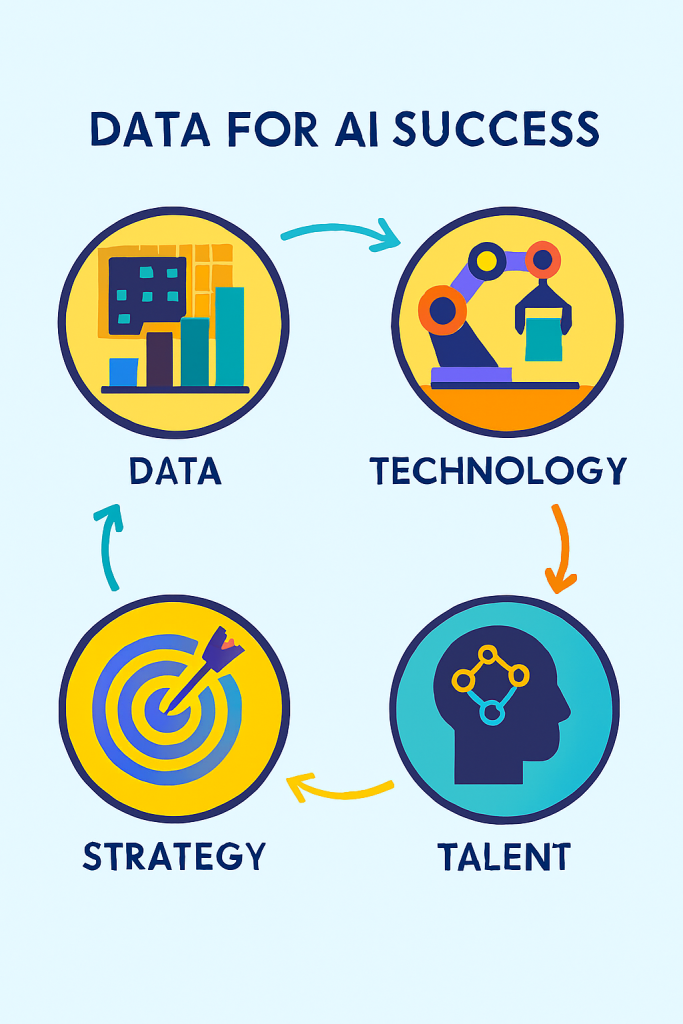Industry veterans unpack the pivotal role of data quality, governance, and sustainability in achieving AI excellence and business value
In the digital economy, data is not just the new oil — it is the oxygen of artificial intelligence. Every successful AI initiative — from predictive analytics to generative models — thrives on a foundation of clean, contextualized, and well-governed data. Yet, as enterprises race to adopt AI, many discover that their greatest obstacle isn’t the sophistication of algorithms but the fragmentation and unreliability of their data ecosystems.
To explore this critical intersection between data and AI, Enterprise IT World MEA brought together a panel of thought leaders and CIOs, moderated by Sandeep Mahindra, Senior Enterprise Solution Architect. The discussion uncovered how data quality, compliance, sustainability, and executive alignment are shaping the next era of enterprise AI.

“Technology doesn’t decide business — business decides technology. AI must be explainable, compliant, and auditable.”
– Sandeep Mahindra, Senior Enterprise Solution Architect
Building the Foundation: From Data Chaos to Data Confidence
“AI depends on data — garbage in, garbage out,” says Jacob Mathew, Senior CIO at a major government entity. “If your data isn’t governed, secured, and standardized, you’re training AI on noise, not intelligence.”
Mathew’s remark reflects a reality that enterprises are increasingly confronting. Decades of legacy systems, fragmented ERP modules, and inconsistent data ownership have left organizations struggling with data chaos — making AI’s promise of efficiency and prediction elusive.
He emphasizes that governance and control must precede innovation. “Every organization should begin its AI journey with a data readiness audit. Without accountability and structured access policies, AI becomes a liability rather than a tool of transformation.”
For Mathew, data governance is not just a compliance checkbox — it’s a business enabler. “When you build a single source of truth across departments, AI insights become reliable. Only then can analytics translate into action.”
“AI depends on data — garbage in, garbage out. Without governance and control, AI projects are destined to fail.”
— Jacob Mathew, Senior CIO, Government Entity

Business Value First: AI Beyond the Hype
At the heart of every enterprise transformation lies a simple truth: business impact trumps technological fascination. Ali Katkhada, Group CIO of Depa Group, articulates this point with clarity: “Business doesn’t care about technology — it cares about profitability. Whether you use AI, blockchain, or ERP, it must contribute directly to business efficiency and growth.”
Katkhada, who oversees complex technology transformations across the construction and manufacturing ecosystem, warns against AI hype without clear ROI. “Most organizations rush to deploy AI tools without assessing whether the underlying data is ready. Integration across design, procurement, and project management platforms is complex — and unless that data is harmonized, AI becomes nothing more than a pilot project that never scales.”
He also underscores the growing importance of global compliance frameworks. “Regulations like GDPR, ISO 42001, and the EU AI Act will dictate how organizations collect, use, and share data. For multinational enterprises, ensuring compliance across geographies is becoming as crucial as innovation itself.”
Katkhada’s vision is pragmatic: build AI where it matters most — where it drives measurable outcomes. “A well-defined data and compliance strategy will determine who wins in the AI economy,” he concludes.

“Business doesn’t care about technology — it cares about profitability. AI must serve business efficiency and value.”
— Ali Katkhada, Group CIO, Depa Group
Reality Check: The Trust and Vendor Challenge
Shailesh Mani, Group IT Head at DBMSC Steel Group, brings a grounded, operational perspective. His experience leading digitalization in one of the region’s largest steel distributors gives him a front-row view of AI’s real-world challenges.
“Everyone today claims to be an AI company,” says Mani. “But when you dig deeper, very few can demonstrate real-world implementations. Enterprises need partners who understand both the business process and data integrity — not just theoretical models.”
For him, the trust factor is the biggest challenge. “When AI vendors demand enterprise data access, security and confidentiality concerns multiply. The business cannot risk proprietary or sensitive operational data being exposed. That’s why we need strict frameworks for data sharing and anonymization.”
Mani also points to a cultural shift that enterprises must navigate. “Decision-makers still hesitate to invest in data modernization because the ROI isn’t immediate. But without that groundwork — clean, structured, high-fidelity data — AI adoption becomes an exercise in frustration.”
He adds, “The challenge is not whether AI works — it’s whether the data behind it is trustworthy enough to act upon.”

“Everyone claims to be an AI player today, but few can deliver real-world impact or trustworthy solutions.”
— Shailesh Mani, Group IT Head, DBMSC Steel Group
Data as a Strategic Asset: The Role of Master Data Management
“Data is the new asset class,” asserts Kumar Prasoon, CIO of Twyn, who has built his career at the intersection of enterprise architecture and data-driven innovation.
He believes that AI success begins not with algorithms but with a culture of stewardship. “Every CXO must take ownership of master data management. It’s not an IT function; it’s a business imperative. Fragmented data leads to fragmented decisions.”
Prasoon emphasizes that modern enterprises must invest in data harmonization across ERP, CRM, IoT, and ESG systems. “You can’t run predictive models or digital twins without unified and contextualized data. And when your data lacks consistency, your AI models lose credibility.”
He also introduces a forward-looking concept — data as currency for ESG and sustainability. “In the future, enterprises will be valued by the quality of their data — how transparent, traceable, and ethical it is. Data is becoming the foundation for ESG scoring and sustainability financing. That’s why AI and data governance must align with environmental and social goals.”
For Prasoon, AI maturity is inseparable from data maturity. “A smart enterprise is one where every byte of data is treated as a business decision waiting to happen.”

“Master data management is not just IT’s job — it’s a business mandate. Data is a new asset class.”
— Kumar Prasoon, CIO, Twyn
Sustainability Intelligence: Data at the Heart of ESG
“Data is central to sustainability,” explains Levent E., Chief Strategist for Climate, Sustainability & AI and Global Head of Sustainability Partnerships at Informatica. “Over 80% of an enterprise’s carbon footprint lies in Scope 3 emissions — data that resides outside your own organization.”
This makes external data partnerships and advanced data governance critical for ESG transformation. “AI can only optimize sustainability performance when it’s fueled by accurate, integrated, and verifiable data. That’s why master data governance and data lineage tracking have become vital tools for climate accountability.”
Levent highlights a rising frontier — geospatial and satellite data analytics — as a powerful enabler of sustainability intelligence. “We now have AI models that can analyze satellite imagery to track deforestation, water scarcity, or logistics inefficiencies. This is where data, AI, and sustainability converge to create measurable planetary impact.”
He also underscores the cross-functional collaboration necessary for responsible AI. “Sustainability cannot be owned by one department. Legal, risk, finance, and IT must work together. AI-driven ESG intelligence requires data that is not just available, but ethically managed.”
For global enterprises, Levent believes that AI-powered sustainability data management will soon become a competitive advantage — driving green investment and consumer trust.
“Data is central to sustainability. Scope 3 emissions data drives ESG performance and green financing.”
— Levent E., Chief Strategist for Climate, Sustainability & AI, Informatica

AI for Profit and Planet: A Saudi Success Story
From compliance to execution, Asim Badhuralam Syed, Group CIO of Al Jabr Holding Group, brings the conversation full circle. His experience integrating AI across manufacturing, logistics, and retail in Saudi Arabia illustrates the tangible outcomes of a data-driven AI strategy.
“We used AI-powered IoT analytics to monitor real-time energy consumption in our manufacturing plants,” says Syed. “It helped us reduce costs, improve efficiency, and was even recognized by the Saudi government for sustainability excellence.”
His team also applied AI-driven route optimization across a fleet of over 8,600 trucks. “The result was reduced fuel consumption, lower emissions, and faster deliveries. It’s a perfect example of how data and AI can align business growth with environmental responsibility.”
Syed’s mantra for CIOs is simple but powerful: move from IT support to sustainability orchestration. “Data is the bridge that connects business performance with purpose. When you apply AI to clean, accurate, and compliant data, you unlock both profitability and planetary impact.”

“IT must evolve from support to sustainability orchestration. Data-led AI drives both profit and planet.”
— Asim Badhuralam Syed, Group CIO, Al Jabr Holding Group
From Compliance to Competitive Advantage
Moderator Sandeep Mahindra summarizes the discussion with a powerful insight: “Technology doesn’t decide business — business decides technology. Ethics, compliance, and governance are the pillars of sustainable AI success.”
He points out that enterprises are entering a new phase where data-driven AI must be explainable, compliant, and auditable. “Enterprises that treat data as an afterthought will face rising regulatory risk and declining trust. The future belongs to organizations that embed governance and transparency at the core of their AI strategy.”
Mahindra envisions a world where AI-driven decision-making is as accountable as financial reporting. “CIOs and CISOs will soon be answerable not just for uptime or cybersecurity but for data ethics and AI outcomes. It’s a cultural transformation as much as a technological one.”
The Road Ahead: Responsible, Resilient, and Data-Led
As the panel drew to a close, a clear consensus emerged: AI success is impossible without data discipline. Clean, contextual, and compliant data will define not only the accuracy of AI models but also the credibility of the enterprises deploying them.
Jacob Mathew’s warning, “Garbage in, garbage out,” remains the enduring mantra. Whether it’s sustainability insights, predictive maintenance, or generative innovation, the value of AI mirrors the quality of its data.
The future will belong to data-resilient organizations — those that treat information as a living, breathing asset, governed with the same rigor as finance or compliance. From the boardroom to the cloud, from ESG to ERP, the new enterprise playbook is clear: Data isn’t just powering AI — it’s defining the future of intelligent business.



